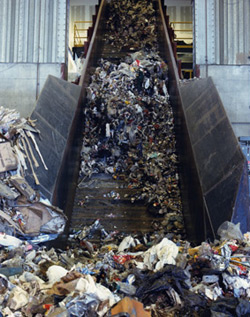 There are plenty of options when it comes to conveyors for bulk material, and two of the most common are belt conveyors and apron conveyors. Both of these conveyor categories offer advantages and drawbacks, and if you’re trying to decide which will best fit your company’s needs, there are plenty of questions that you need to ask. Materials Handling Equipment (MHE) has been manufacturing heavy-duty conveyors for some of the largest industrial companies in the U.S. since 1927, so we’re uniquely qualified to compare and contrast these two options.
There are plenty of options when it comes to conveyors for bulk material, and two of the most common are belt conveyors and apron conveyors. Both of these conveyor categories offer advantages and drawbacks, and if you’re trying to decide which will best fit your company’s needs, there are plenty of questions that you need to ask. Materials Handling Equipment (MHE) has been manufacturing heavy-duty conveyors for some of the largest industrial companies in the U.S. since 1927, so we’re uniquely qualified to compare and contrast these two options.
Apron Conveyors
Apron conveyors—or pan conveyors, as some refer to them—consist of endless chains that are attached to overlapping and interlocking plates that form a surface that carries bulk materials without containers. They are used to move material to a crusher or other piece of equipment at a consistent rate. Apron feeders are especially adaptable and can handle many types and sizes of material.
Belt Conveyors
Belt conveyors are the simplest of material handling conveyors, as they consist of two or more pulleys (or drums) driving an endless loop belt that carries bulk material. There is at least one drive pulley that is powered and moves the belt, and idler pulleys help guide the belt.
Belt & Apron Conveyor Durability
This is where these two options diverge. Belt conveyors are the most common conveyor option, as they are ideal for retail, wholesale, manufacturing, and warehouse applications. Belt feeders can move items at a high rate of speed for long distances, so they can accommodate higher volumes. However, belt conveyors aren’t ideal for many heavy-duty applications where a belt won’t hold up and require consistent maintenance.
Apron conveyors, on the other hand, are in their element when being used in environments that feature extreme temperatures, abrasion, and corrosion. While they can’t operate at the same speed as belt conveyors, they are manufactured using components that can handle daily wear and tear from larger material and heavier loads. They’re also better able to withstand extreme-impact loading. And while apron conveyors typically require a higher capital investment, they offer an excellent return on investment due to their durability.
The Heavy-Duty Conveyor Specialists
Materials Handling Equipment isn’t just a leader in the conveyor manufacturing industry—we actually helped craft the Conveyor Equipment Manufacturer’s Association (CEMA) standards. We stand out from our competitors by offering custom conveyors—including belt and apron conveyors—that can be tailored to fit any need.
Additionally, we specialize in conveyors that will perform reliably in some of the most severe conditions possible. MHE conveyors feature internal heavy-duty Ni-Hard gravity take-up bearings, custom-engineered drive components, and easy-to-access points of entry for easier routine maintenance. These are just some of the reasons why leading companies from a range of industries, including construction, cement, steel, chemical, and mining, turn to us for their conveyor needs.
Schedule a Consultation
If you’re trying to decide between a belt conveyor or an apron conveyor for your facility, enlist the help of the trusted professionals at Materials Handling Equipment. Contact us today if you’d like to learn more about the custom conveyors we offer.
